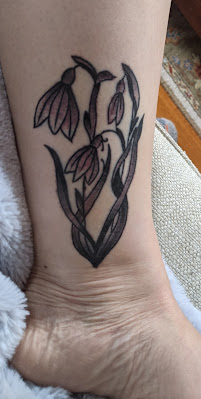I love Mel's monthly posts about the best books she's read that month, and they often inform my To Be Read list (or push books already there up in the reading queue). Instead of commenting on her June post with my list, I thought I'd join the movement with a post of my own. Now that July's on the waning side.
June was a funny month because most of it was the tail end of the school year, which tends to be less stressful but more bittersweet, and is filled with events and celebrations -- 8th Grade Luau! Retirement Gatherings! Graduation Car Parade! End of Year Celebration Parties! But, the last week of June was the first week of break, and boy did I utilize that to catch up on reading and just melt into stress-recouping. That week I averaged a book a day. Here are my books:

Scythe by Neal Shusterman
Thunderhead by Neal Shusterman
The Toll by Neal Shusterman
These three books are a trilogy, Arc of a Scythe, and they were re-reads for me. I absolutely love Neal Shusterman and this is one of the most satisfying and thought-provoking trilogies I've EVER read. The concept is that humankind has evolved technology so that death no longer exists naturally, so there need to be Scythes whose job it is to kill and keep the population under control (and give some semblance of mortality, because...where does motivation come from if you can live forever?). The world is sort of governed by the Thunderhead, a maybe-sentient "cloud" of AI that makes sure if you die accidentally, or "splat" as teens like to do (jumping off high places knowing you'll be revived for the thrill of it), you are taken to a Revival Center and back good as new. If you are gleaned by a Scythe, you don't get revived. You're done. There's a sort of new Scythe faction that thinks they should have fun with it and not have quotas, and others who find that distasteful and an abuse of a sacred duty. Anyway, this follows two teens who are chosen to be Scythe apprentices and then get embroiled in all the drama. It's AMAZING. My favorite is Thunderhead because it's absolutely bananapants. But not in a way that makes you scream "COME ON!" and throw the book across the room. I reread because a bookclub I sort of muscled my way into chose Scythe, and I fully intended to only reread that one, but found myself going all the way through. Because it's that good. Also, the cover art is amazing.
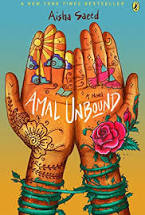
Amal Unbound by Aisha Saeed
I actually read this between Books 2 & 3 of Arc of a Scythe, because the author did a Zoom-author-visit to our school in June. Normally we have an author come and we do three presentations, one for each grade level (6, 7, 8) in the auditorium, but...COVID. This is an assigned novel for 7th grade, and it was so good -- a feisty girl in Pakistan has to leave school when her mother has another baby and it turns out to be another girl, which puts her into a deep postpartum depression. Amal must take over household duties even though she dreams of finishing out school and going to college. Frustrated with the situation, she goes to market and has an altercation with the crooked landlord who terrorizes her whole town over a pomegranate, that results in indentured servitude for Amal. It's a great book about a practice that STILL EXISTS around the world today, and explores what everyday life is like in Pakistan, and gives hope that with the strength of ordinary people, corrupt systems can be overturned. In her talk, Aisha Saeed talked about the importance of having positive stories from countries that are often only shown in a negative light, and how important it was for her to show that you don't need to be Malala to make a difference, small heroic acts matter as much as the big ones. (She has nothing against Malala, just wants kids to know you don't have to be a public figure to be important.) She also talked about the importance of diversity in books and authors and how she was published by her TWENTY-SEVENTH publishing house, the last one she had to submit to, because all the rest originally said "oh, no one wants to read about Pakistan. That doesn't sell" WTF.
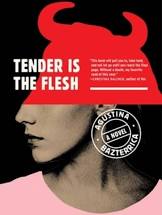
Tender Is the Flesh by Augustina Bazterrica
This was a Bryce Book, a belated birthday present. It stuck with me and is very, very disturbing but also insanely thought provoking. Basically... in the future there is a virus that makes animals unfit for consumption and so instead of going to an all plant protein source...there is a change. Humans specially bred for consumption, renamed "Head" (like head of cattle), are now raised, processed, and sold for meat. It's basically...what does it take to make the unthinkable...possible? Palatable? Ha ha. There is an infertility subplot in here and the way it is described is definitely...accurate. It does feed into some of the more disturbing aspects of the book. There were times when I felt like I was reading Upton Sinclair's The Jungle...but with people. The end is one of the most shocking I've ever read, I literally sat on the couch with my mouth open for probably a good twenty minutes and then went back and read a bunch of passages to Bryce. It's so, so good, but definitely not for the squeamish.

Unspeakable Things by Jess Lourey
Holy crap! I didn't realize until JUST NOW that this book is by the author who INSPIRED MEL'S MONTHLY BOOK LIST POST! Small, small world. This book initially sounded like it would have a supernatural element: kids are being taken and they come back changed, and the narrator calls it "the darkness." However, very early in the book you realize that the monster is humans, and what they are capable of doing to other humans. There's abuse of different kinds in the book, handled sensitively and thoughtfully. There's a sort of whodunit aspect. There's a boatload of suspense. And, family dynamics that are...interesting. It was a good read, left me a bit disturbed but in a good way.

House of Leaves by Mark Z. Danielewski
This book is hard to classify. It was a Bryce pick, and it was WORK. But delicious work. Basically, the book goes back and forth between academic-style analysis of a documentary film made about a house that was bigger inside than outside and contained...some kind of force you don't really want to contend with; footnotes that are the sort of lost soul, druggy sex-y guy who found the manuscripts and is editing/compiling them; and notes/footage script from the actual forays into the house. There's some Greek Mythology (minotaurs and labyrinths!) there's a lot of sex and drug references and descent into un-reality on the part of the guy compiling, density in the academic analysis parts, and then the actual story of the house that grew a closet that grew the inside into some sort of dark Narnia, with fascinating typesetting choices that leave the reader feeling disoriented, just like the people in the expanded parts of the house. It was really, really good, but really, really time-intensive (over 700 pages) and required patience (and a lot of flipping the book around), but the concept is awesome.
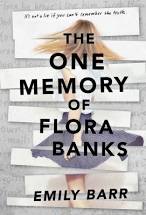
The One Memory of Flora Banks by Emily Barr
A former student recommended this book to me, it is a sort of twisty YA story of a girl, Flora, whose memory is damaged from a childhood health crisis. Think 50 First Dates with Adam Sandler and Drew Barrymore, but young adult and a bit less romantic. Flora has a fight with her best friend over a boy (Flora has to write everything that happens on her arms or on post-it notes, sort of like the movie Memento, so when she smooches her best friend's supposedly ex-boyfriend who's about to go to the Arctic Circle in Sweden, she sort of blows herself in), which results in her being unsupervised while her parents fly to Paris to be with her older brother, who is very ill. She decides to go after the boy and discovers a lot of things in the house that make her question her own reality (she DOES have a passport! She could have gone, why did they tell her she had to stay home because she doesn't?). It is adventure, a little tiny bit romance, mystery, and ultimately about the power (for good or bad) that other people's expectations can place on you. It was absorbing!
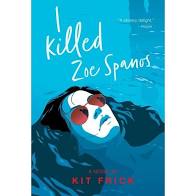
I Killed Zoe Spanos by Kit Frick
I have had this book for a while, it called to me from my tiny independent bookstore nearby with its groovy cover and blue edges. A murder mystery that starts with a confession and works backwards, it sort of reminded me of the first season of the Serial podcast. Anna Cicconi has confessed to killing Zoe Spanos, but the how and why (and if) are revealed through flashbacks to when she first went to the Hamptons to be a nanny in a fancy neighborhood, a podcast by a student who is friends with Zoe's younger sister, both when Zoe disappeared and after her body was found and Anna confessed. The kicker is that when Anna went to the Hamptons, a place she'd never been, she found people doing double takes because she looks just like Zoe, the girl who's already disappeared. Not only does she look like Zoe, she seems to have freaky knowledge of things that she shouldn't if she's truly never been there. It sort of goes modern gothic, and it was super absorbing and twisty. It did take me a moment to get into the book the first time I picked it up, but I think that was just the anxiety during school, because once it was summer I flew threw it.

you don't have to be everything: Poems for Girls Becoming Themselves edited by Diana Whitney
Picked this up in my tiny but insanely well curated bookstore, because I was like, "THIS WOULD BE GREAT TO HAVE FOR STUDENTS." I read it, and immediately was like, "where was this book when I was growing up???" I immediately gave it to my former student who was in foster care and who I still see for outings (think Big Brother Big Sister, sort of), because she's 14 and 14 is a confusing, sucky time. And then I ordered another to have in my classroom.

Before the coffee gets cold by Toshikazu Kawaguchi
Thank you, Mel, for recommending this book in one of your Best Books of posts! Guess where I bought it... (Tiny bookshop for the win! Trying to give as little of my book money to Amazon as possible.) It was definitely a quirky read, with the concept that there's a little coffee shop that has magical properties. Basically, you can go back in time if you sit in a particular chair, but there are caveats. You have to first get the chair, frequently occupied by a woman who generally doesn't want to give it up. Then you must think of a time you want to go back to, but it has to be in the coffee shop, with someone who's been in the coffee shop (so no going back to a wedding or a conversation you had in college), and you can't leave the seat while you're there. You have from the time the coffee is poured to the time the coffee gets cold to drink the cup and return back. And, you can't change anything that's already happened. SO WHY WOULD YOU DO IT? You get four people who do it for very different reasons, and get to decide if it was worth it. It really makes you think about the consequences of events and what is changeable and what is not, and the power of things unsaid. LOVED it.
There it is, the books of June! A lot of thought-provoking stuff, actually. And mostly books you can just disappear into, which for me is what summer is all about. A vacation between pages.
What have you read recently that you've loved?



